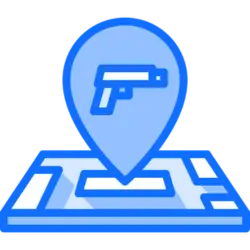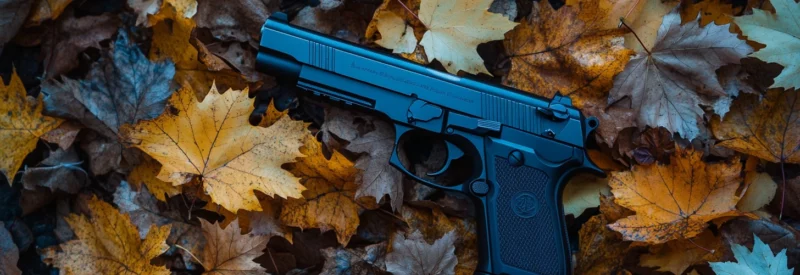Maine is an ideal place for those looking to secure an FFL and start their firearms business. While this process is not without its roadblocks, it is easier in certain states than others.
In 2020 alone, it is estimated that over 135,062 firearms were sold within the state’s borders.[1]Security.org “Gun Country: Where in the U.S. Are Guns Most Popular?.” Accessed on October 24, 2024. Despite the thriving gun trade, Maine residents must first acquire an FFL to enter this lucrative market.
An FFL, or Federal Firearms License, is legal documentation allowing individuals to buy or sell firearms, ammunition, or related products. Maine is one of the states where acquiring a federal firearms license is surprisingly straightforward if not exactly a cakewalk.
Below, we will break down the five steps you’ll need to master to get your hands on an FFL in Maine: how to apply, what to include in your application, and much, much more. Let’s begin!
Getting a Maine FFL: An Introduction
As we mentioned above, FFL stands for Federal Firearms License. Anyone who is looking to buy or sell guns in a professional capacity is going to need one of these, including Maine residents.
When you obtain an FFL, you are essentially letting the government know that you’re in the business of buying, selling, or manufacturing firearms or ammunition. This means adhering to specific rules and regulations regarding the sale of firearms in Maine. Below, we’ll learn about the first step in securing an FFL for your firearms business.
Step 1: Meet All of the FFL Requirements
Business owners and entrepreneurs take note: meeting the federal requirements for possessing an FFL is the first essential part of this process. These requirements can seem daunting when viewed from a distance, as they encompass federal, state, and local mandates.
At a certain point, you’ll need to set up a high-risk merchant account. In high-risk industries, there can be an increased likelihood of fraud and chargebacks. Ultimately, this can limit your access to processing services. Since firearms are an inherently high-risk industry, you’ll eventually need to set up a high-risk merchant account that can handle your business volume. To learn more about what a high-risk merchant account entails, check out the video below:
If the process of securing an FFL sounds intimidating, do not worry: resourceful business owners will find themselves more than up to the challenge. If you are looking to get an FFL in Maine, you are in luck, as the Pine Tree State is a place where it’s easier than one might think to start a firearms business. Read on to find out why that’s the case:

Federal requirements
FFL requirements at the federal level are the same across all fifty states, meaning every North American citizen hoping to obtain an FFL license must follow them. These requirements include:
- Being at least 21 years of age or older.
- Being a permanent resident or natural-born citizen of the United States.
- Having a clean criminal record.

State requirements
The federal requirements needed to secure an FFL are the bare minimum of what you’ll need in the long run. Regarding state laws, each state has the right to establish its own singular regulations. Whether it’s licensing requirements or background checks, you can never be too prepared before diving headfirst into the application process.
Some states do not impose additional mandates for procuring an FFL beyond what is required at the federal level. Thankfully, Maine is one of those states. All you’ll need to start your FFL application at the state level is proof that you have correctly registered your business. That’s all! Keep in mind that registration is standard procedure regardless of which state you live in. Whether your business is established, brand new, or simply switching locations, you must nevertheless ensure that you are appropriately registered with the state.[2]Maine.gov. “Starting a Business.” Accessed on October 24, 2024.

Local and zoning requirements
Regarding local and zoning requirements, Maine is not known for imposing overbearing regulations on aspiring firearms merchants. However, this is not to suggest that securing zoning for your new business will be a walk in the park.
For many merchants, attaining proper zoning is one of the most challenging portions of securing a federal firearms license. This wisdom holds especially true for merchants hoping to start a home-based FFL. What can you do to prepare? Make sure you have an ironclad business plan ready to go, and, if necessary, be sure to speak with your local zoning department about the specific nature of the business you are starting, the volume of foot traffic you are expecting, and any other relevant details.
Step 2: Select the Type of FFL You Need
Federal firearms licenses have three primary categories: dealer, manufacturer, and importer.
Those licensed in the “dealer” category can sell firearms, whereas those who fall under the “manufacturer” banner tend to be in the business of firearm production. Importer licenses are required for importing firearms and ammunition from around the world.
Each license comes with its own set of rules. The goal is to ensure that those holding these coveted licenses practice their trade within the confines of local, state, and federal law. Understanding the nuances of these categories will help merchants comply with and understand the intricacies of firearm-related regulations and transactions.

FFL license types
Knowing which FFL license to apply for will make a world of difference in terms of your professional success. To determine which license suits you, you must consider your specific needs as a business owner. Are you in the business of selling guns? If so, will you sell them online or at an in-person location? Do you plan on catering to a rarefied niche market? What payment types do you plan on accepting?
Once you have a concrete understanding of your business needs, you can start exploring FFL license options that can accommodate those needs.
Step 3: Complete an Online FFL Course

Want to become an expert in a particular subject practically overnight? You can’t go wrong with taking an online course. While not a legal necessity, an online FFL course can make a major difference in getting a leg up in firearms sales. In taking one of these courses, you’ll gain a thorough, all-encompassing understanding of the rules and regulations that govern firearm sales in this country, as well as critical safety measures and procedures that every law-abiding firearm merchant must become familiar with.
As mentioned, taking or completing an online FFL course in the state of Maine is entirely optional. However, despite not being an obligation, these courses still represent a sound investment for firearms merchants, especially those looking to expand their knowledge base.
Step 4: Apply For Your Maine FFL
Your business plan is in good shape. You’ve calculated potential overhead costs. Zoning regulations have been taken care of. You understand the rules around waiting periods, and your merchant account has been set up.
Congratulations, you’ve made it this far. Now, it’s time to apply for your federal firearms license.
To apply on the federal level, you’ll need:
- A completed application[3]ATF. “Application for Federal Firearms License.” Accessed on October 24, 2024.
- Fingerprints for conducting a background check.
- Photographs for the purposes of creating your FFL license.
Step 5: Have an Interview with a Representative From Your Regional ATF Office
Having a sit-down interview with an ATF representative is one of the last significant steps you’ll take in acquiring your FFL. During said interview, you’ll be asked to provide information about yourself, your business, and your business plan, among other pertinent details.
You can also expect the ATF rep interviewing you to inquire about your business location and your experience in the firearms sector. They may also ask about the types of firearms you plan on selling, the payment methods you accept, and any additional details about your background germane to the conversation. Our advice: be honest, be persuasive, and be sure to prepare. The better you do during this interview, the higher your chances of securing an FFL. Remember, this is an opportunity to showcase your enthusiasm and comprehensive knowledge of gun laws, so don’t be afraid to flaunt your knowledge!
While it’s natural to be nervous throughout this process, a well-prepared merchant has no reason to worry. The representative is ultimately here to help guide you through the process and ensure you comply with all federal regulations.
FFL License Costs in Maine
As with any procedure, fees and costs are simply part of the process. All FFL holders must pay a fee for their license, and the federal government sets the price.
The exact nature of this fee largely depends on the type of FFL you’re applying for and the overall nature of the business in question. Since these fees fluctuate depending on several circumstances, we recommend locking in your business model. Setting aside extra funds to pay fees doesn’t hurt either.
Getting a Federal Firearms License in Maine: Closing Thoughts

Getting an FFL in any state, including Maine, is far from a cut-and-paste process. It is costly and time-intensive and requires many steps, preparation, and patience.
That said, Maine is known for its streamlined FFL application process. Moreover, they have earned a reputation for efficiently administering federal firearms licenses to qualified applicants. Once you’ve finally gotten a federal firearms license, you can legally buy and sell firearms without fear of violating state or federal laws. In addition, acquiring an FFL allows license-holders to attend gun shows and access wholesale firearms pricing and gives merchants a competitive edge in today’s marketplace.
However, firearms are still a high-risk industry. Knowing this, we encourage merchants to partner with a gun-friendly merchant service provider that has their needs in mind. Gain access to processing tools, payment solutions, fraud prevention tools, and more—it’s all out there waiting for you. Don’t wait a second longer—lock down your merchant account today.
High-Risk Businesses Wanted.
Your troubles of getting approved are over!
Satisfaction.
FFL Maine FAQs
Do I need an FFL in Maine?
If you plan on running a firearms business in Maine, you must eventually procure an FFL. Gun owners looking to purchase a weapon for personal use need not apply. However, the legal sale of guns and ammunition is a different story. By acquiring an FFL, merchants will gain access and resources to an assortment of industry-specific networks that will add longevity to their business.
Who can apply for an FFL in Maine?
Anyone who meets the federal government’s requirements can apply for a federal firearms license in the state of Maine. The applicant must be at least twenty-one years old and either a United States citizen or a legal permanent resident of the country. Applicants cannot have a felony conviction on their record, nor can they have any offense or charge related to the sale or recreational use of firearms or explosives.
Applicants must also pass a mandatory background check, including a thorough review of said applicant’s criminal history and a fingerprint scan. The process of attaining an FFL is lengthy and occasionally stringent; however, it remains a necessary step for those who wish to enter into the business of buying and selling guns and ammo.
Do I need to register as a business to get a Maine FFL?
Having a properly registered business is critical for getting your FFL in Maine. If you have a business set up in another state, you must still register your firearms business in Maine if you plan on buying and selling firearms within its borders.
How can I find an FFL dealer in Maine?
There are numerous ways to locate a reliable and trustworthy FFL dealer in Maine. One method involves utilizing the ATF’s online FFL search tool, which provides an all-inclusive list of all licensed FFL dealers in the state. Sites like Armslist and GunBroker can also be valuable resources for locating databases of qualified FFL dealers.
If all else fails, seek recommendations from friends, business partners, or local gun shops. Word of mouth, however old-fashioned, can go a long way in these scenarios. Double-check your dealer’s credentials before purchasing firearms or ammunition when in doubt.
Can you have a home-based FFL in Maine?
Yes, firearm merchants can operate a home-based FFL in the state of Maine.
Can I apply for an FFL with a Maine gun trust?
The Bureau of Alcohol, Tobacco, Firearms, and Explosives does not permit gun trusts to apply for an FFL, regardless of the state in question. The ATF demands that applicants conform to specific criteria before receiving an FFL, including passing a background check.
Does the BATF&E have requirements for an FFL in Maine?
The Bureau of Alcohol, Tobacco, Firearms and Explosives, also known as the BATF&E, or simply ATF, is in charge of monitoring and regulating the firearms industry at the federal level. As such, they are in charge of imposing federal requirements. In terms of state-specific requirements, this is one part of the process that Maine residents have easier than gun merchants in certain other states.
Do I need to apply for an SOT for my Maine FFL?
The answer to this question largely depends on which types of weapons you plan on selling. A Special Occupational Taxpayer, or SOT, can come in handy if you deal with items such as machine guns, short-barreled rifles, or suppressors: in other words, products that some may consider to be quite dangerous.[4]ATF. “National Firearms Act.” Accessed on October 24, 2024.
How long does it take to get your FFL in Maine?
In a sense, every FFL application is unique. Upon submission, most merchants will receive their approval within sixty days. However, you may need extra time to prepare your application, organize your business plan, etc. The fact that Maine does not impose state-specific laws on gun merchants means the process, on the whole, ends up being more efficient than it might in other, less firearm-friendly states.
How can I transfer an FFL in Maine?
FFL transfers in Maine are permitted only under certain, specific circumstances.
How much does an FFL transfer cost in Maine?
The cost of an FFL transfer in Maine largely depends on the dealer. Mostly, the price ranges from $20-$50. Do your research and find a reputable dealer who won’t charge you an arm and a leg. Also, save some extra money for background checks and shipping fees if possible.
How hard is it to get an FFL in Maine?
Since Maine does not impose state-specific regulations on its gun merchants, aspiring FFL applicants need only adhere to federal mandates. This comparative simplicity means that acquiring an FFL is easier in Maine than in certain other states.




